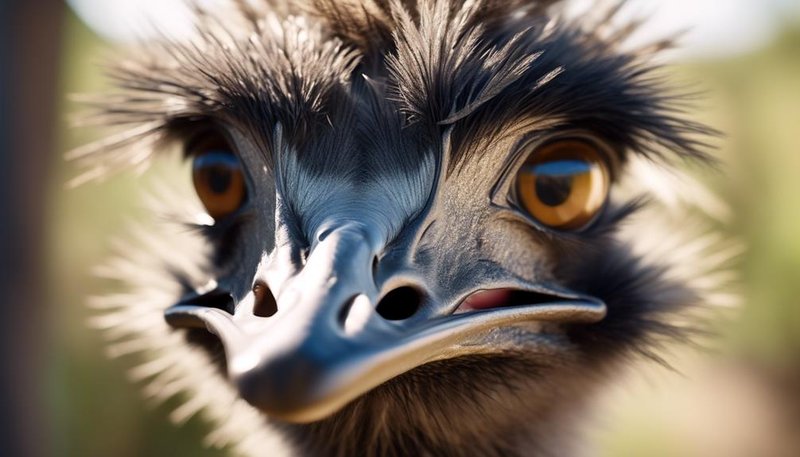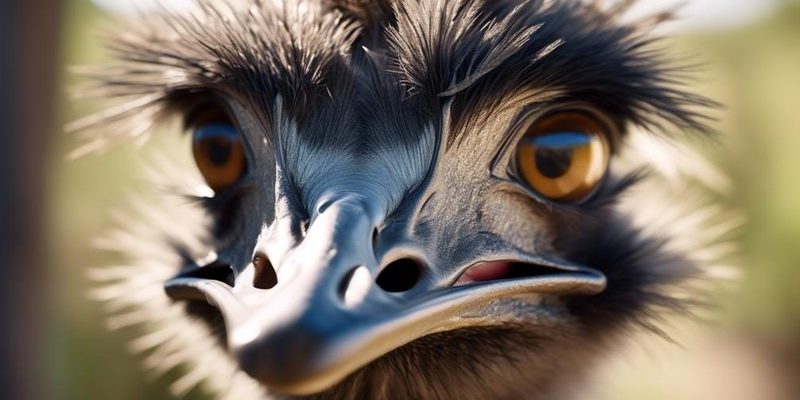
You might be wondering exactly how intelligent these birds are. Are they more like dogs, with a knack for problem-solving, or more akin to cats, who seem to have their own agenda? To answer that, we’ll explore emus’ cognitive abilities, social behaviors, and how they adapt to different situations in their environment. By the end, you’ll likely see emus in a whole new light!
Understanding Emus: An Overview
Emus are the second-largest birds in the world, native to Australia. They stand tall at about 6 to 7 feet and are known for their long necks and strong legs. But when it comes to their brains, emus are surprisingly complex. These birds aren’t just oversized chickens; they have unique adaptations that help them thrive in the wild.
One of the coolest things about emus is their adaptability. They can live in diverse environments, from forests to grasslands. This adaptability has led them to develop various behaviors that indicate intelligence. For instance, emus are known to communicate with each other through a range of sounds, from booming calls to soft coos. This vocal communication showcases their social nature and ability to respond to their surroundings.
Another fascinating aspect of emus is their diet. They are omnivorous, munching on a variety of plants, seeds, and insects. This diverse diet requires them to remember where to find food, suggesting that they have decent memory skills. Who knew these large birds could be so resourceful?
Cognitive Abilities: How Smart Are Emus?
When folks talk about animal intelligence, they often compare memory, problem-solving, and social behaviors. Emus shine in all these areas. Studies show that these birds can learn and remember tasks. For example, they can navigate mazes and remember locations of food. It’s like they have a mental map of their environment!
Research has also shown that emus can recognize patterns and solve simple problems. Imagine placing a treat under a cup and then moving the cups around. Emus can often figure out where the food is hidden after a few tries. This ability to solve problems is a key indicator of intelligence.
Another interesting point is that emus have excellent long-distance vision. They can spot predators from afar, which is a crucial survival skill. This keen eyesight, combined with their social behaviors, helps them thrive even in harsh conditions. So, when you see an emu strutting around, remember there’s a lot more going on in that head than it might seem!
Social Behavior: Communication and Interaction
Emus are social birds and often form groups, especially when it comes to foraging for food or migrating. They have a unique way of communicating with one another. You might hear them making a variety of sounds, from low-frequency booms to chirps. These calls are used to maintain social bonds and alert others to dangers nearby.
Interestingly, emus also engage in what looks like playful behavior. They can chase each other, play hide-and-seek among bushes, and even wrestle, which indicates they have a sense of social playfulness. This playful interaction is not only fun to watch, but it also fosters relationships within the group.
One thing to note is that emus are quite protective of their young. The males are responsible for incubating the eggs and raising the chicks. During this time, they make sure to keep the chicks safe from potential threats. This nurturing behavior shows a level of intelligence where emus can understand the importance of protecting their offspring.
Decision-Making Skills: Flexible and Adaptive
Emus are known for their adaptability, which reflects in their decision-making skills. These birds can assess their environment and make choices that benefit their survival. For instance, when foraging, emus often choose food that is abundant and nutritious, demonstrating their ability to weigh options based on availability and health.
Moreover, emus will change their behavior based on previous experiences. If they encounter a predator or learn that a specific area is unsafe, they quickly adapt by avoiding that space in the future. This ability to learn from experiences and alter their actions shows a level of cognitive flexibility.
In more complex situations, emus exhibit a form of teamwork. They can work together to fend off predators or help each other find food. This cooperative behavior makes them seem more intelligent, as they recognize the benefits of collaboration.
Emus in the Wild: Survival Strategies
In the wild, emus utilize their intelligence for survival. They can travel great distances to find food and water, especially in Australia’s arid climates. This ability to migrate shows their understanding of seasonal changes and resource availability.
Emus are also known for their unique defense mechanisms. When threatened, they can run at speeds of up to 30 miles per hour. They often choose to flee rather than fight, using their height and speed to escape predators. This instinctual behavior highlights their awareness of danger and willingness to protect themselves.
Additionally, emus will often travel in groups, which provides safety in numbers. This behavior not only helps them avoid predation but also enhances their social structure. It’s like an unwritten rule among emus: “Together, we’re stronger.”
Emus and Human Interaction: A Unique Relationship
Interestingly, emus and humans have had a unique relationship over the years. These birds have been part of Aboriginal culture for thousands of years, featuring in stories and art. Today, they are often farmed for their meat and oil, showing that humans have recognized their value.
In some areas, emus are considered pests due to their foraging habits, especially in agricultural fields. However, there are efforts to manage their populations sustainably. This relationship is a reminder of how intelligent these birds are; they can adapt to human environments while still maintaining their wild instincts.
Educators are also using emus to teach about wildlife conservation. By raising awareness about their behaviors and habitat needs, people are encouraged to appreciate these fascinating creatures. This connection between humans and emus highlights the importance of coexistence and understanding in nature.
Emus may not be the first animal that springs to mind when discussing intelligence, but they certainly hold their own. Through their problem-solving skills, social behaviors, and adaptability, emus have shown that they possess a fascinating level of cognitive ability.
As we’ve explored their behaviors, from communication to survival strategies, it’s clear that emus are more than just quirky birds. Their intelligence allows them to thrive in their environment and maintain relationships within their groups, making them a unique part of our planet’s biodiversity.
Next time you come across an emu—whether in a zoo, on a farm, or in the wild—take a moment to appreciate the complexity of their behavior and intelligence. These charming birds remind us of the wonders of nature and how much we still have to learn about the animal kingdom.

